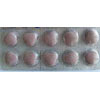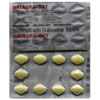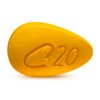 | Extra Super Levitra Active Ingredient: Vardenafil Dapoxetine TestimonialsExtra Super Levitra is used in the treatment of Erectile Dysfunction with Premature Ejaculation.Extra Super Levitra 100 mg contains Vardenafil 40 mg and Dapoxetine 60 mg. |
INDICATIONS
Extra Super Levitra is indicated for the treatment of erectile dysfunction.
INSTRUCTIONS
Use Extra Super Levitra as directed by your doctor.
- Take Extra Super Levitra by mouth with or without food.
- Take Extra Super Levitra about 1 hour before sexual activity.
- Do not take Extra Super Levitra more often than once daily, or as directed by your doctor.
- Check with your doctor before you eat grapefruit or drink grapefruit juice while you use Extra Super Levitra.
- If you miss a dose of Extra Super Levitra and you still intend to engage in sexual activity, take it as soon as you remember. Continue to take it as directed by your doctor.
DOSAGE
Please take the medication exactly as prescribed by a doctor.
Some men can only take a low dose of Extra Super Levitra because of medical conditions or medicines they take. Your doctor will prescribe the dose that is right for you.
- If you are older than 65 or have liver problems, your doctor may start you on a lower dose of Extra Super Levitra.
- If you have prostate problems or high blood pressure, for which you take medicines called alpha-blockers, your doctor may start you on a lower dose of Extra Super Levitra.
- If you are taking certain other medicines your doctor may prescribe a lower starting dose and limit you to one dose of Extra Super Levitra in a 72-hour (3 days) period.
Ask your health care provider any questions you may have about how to use Extra Super Levitra.
STORAGE
Store Extra Super Levitra at 25 degrees C (77 degrees F). Keep Extra Super Levitra out of the reach of children.
MORE INFO:
Active Ingredient: Vardenafil and Dapoxetine.
Do NOT use Extra Super Levitra if:
- you are allergic to any ingredient in Extra Super Levitra
- you have been advised by your doctor to avoid sexual activity because of heart problems
- you have certain heart problems (eg, severe heart failure, angina), low or high blood pressure, severe liver problems or severe kidney problems that require dialysis
- you have certain hereditary degenerative eye problems (eg, retinitis pigmentosa)
- you have had a heart attack, stroke, or life-threatening irregular heartbeat within the past 6 months
- you have a history of a certain type of irregular heartbeat (eg, congenital QT prolongation) or you take certain antiarrhythmic medicines (eg, quinidine, procainamide, amiodarone, sotalol)
- you are taking a nitrate (eg, isosorbide, nitroglycerin) in any form (eg, capsule, ointment, patch, tablet), or nitroprusside
- you use certain recreational drugs called "poppers" (eg, amyl nitrate or nitrite, butyl nitrate or nitrite)
- you take another PDE5 inhibitor (eg, sildenafil, tadalafil) or another medicine that contains vardenafil.
Contact your doctor or health care provider right away if any of these apply to you.
Some medical conditions may interact with Levitra. Tell your doctor or pharmacist if you have any medical conditions, especially if any of the following apply to you:
- if you are taking any prescription or nonprescription medicine, herbal preparation, or dietary supplement
- if you have allergies to medicines, foods, or other substances
- if you have a deformed penis (eg, cavernosal fibrosis, Peyronie disease), blood cell problems (eg, leukemia, multiple myeloma, sickle cell anemia), or any other condition that may increase the risk of a prolonged erection (priapism)
- if you have a history of a prolonged (more than 4 hours) or painful erection (priapism)
- if you have a history of certain eye problems (eg, macular degeneration, optic neuropathy, retinitis pigmentosa, sudden vision loss) or hearing problems (eg, ringing in the ears, decreased hearing, hearing loss)
- if you have a history of liver or kidney problems, dialysis, high or low blood pressure, ulcers, seizures, lung problems (eg, pulmonary veno-occlusive disease), bleeding problems, blood vessel problems, or heart problems (eg, angina, aortic stenosis, heart failure)
- if you have a history of heart attack, stroke, a certain type of irregular heartbeat (long QT syndrome), or a family history of long QT syndrome.
Some medicines may interact with Extra Super Levitra. Tell your health care provider if you are taking any other medicines, especially any of the following:
- Alpha-blockers (eg, doxazosin), medicines for high blood pressure, nitrates (eg, isosorbide, nitroglycerin), or nitroprusside because severe low blood pressure with dizziness, lightheadedness, and fainting may occur
- Certain antiarrhythmics (eg, amiodarone, procainamide, quinidine, sotalol) because the risk of irregular heartbeat may be increased
- Azole antifungals (eg, itraconazole), HIV protease inhibitors (eg, indinavir, ritonavir), macrolide antibiotics (eg, erythromycin), or telithromycin because they may increase the risk of Extra Super Lovevitra's side effects
- Rifampin because it may decrease Extra Super Levitra's effectiveness.
This may not be a complete list of all interactions that may occur. Ask your health care provider if Extra Super Levitra may interact with other medicines that you take. Check with your health care provider before you start, stop, or change the dose of any medicine.
All medicines may cause side effects, but many people have no, or minor, side effects.
Check with your doctor if any of these most common side effects persist or become bothersome:
Dizziness; flushing; headache; heartburn; nausea; stuffy or runny nose; upset stomach.
Seek medical attention right away if any of these severe side effects occur:
Severe allergic reactions (rash; hives; itching; difficulty breathing; tightness in the chest; swelling of the mouth, face, lips, or tongue); chest pain; fainting; fast, slow, or irregular heartbeat; memory loss; numbness of an arm or leg; prolonged, painful erection; ringing in the ears; seizures; severe back or muscle pain; severe or persistent dizziness; severe or persistent vision changes; sudden decrease or loss of hearing; sudden decrease or loss of vision in one or both eyes; sudden, severe headache or vomiting.
This is not a complete list of all side effects that may occur. If you have questions about side effects, contact your health care provider.
 Trial Erection packs 1Viagra 10 pills x 100 mg,
Trial Erection packs 1Viagra 10 pills x 100 mg,Cialis 10 pills x 20 mg.as low as $3
 LexaproLexapro is used for treating depression or generalized anxiety disorder.as low as $0.32
LexaproLexapro is used for treating depression or generalized anxiety disorder.as low as $0.32 Malegra DXTMalegra DXT is an oral medication that treats erectile dysfunction as well as premature ejaculation in men.as low as $1.33
Malegra DXTMalegra DXT is an oral medication that treats erectile dysfunction as well as premature ejaculation in men.as low as $1.33 Cialis ProfessionalCialis Professional is a newly formulated and chemically improved prescription medicine that is taken orally for the treatment of erectile dysfunction only in men, extremely enhancing male sexual activity that is resulted in boosted penile potency, multiplied orgasms and increased penis size. as low as $1.41
Cialis ProfessionalCialis Professional is a newly formulated and chemically improved prescription medicine that is taken orally for the treatment of erectile dysfunction only in men, extremely enhancing male sexual activity that is resulted in boosted penile potency, multiplied orgasms and increased penis size. as low as $1.41 ZithromaxZithromax is used to treat many different types of infections caused by bacteria, such as respiratory infections, skin infections, ear infections, and sexually transmitted diseases. In children, it is used to treat middle ear infection, pneumonia, tonsillitis, and strep throat.as low as $0.46
ZithromaxZithromax is used to treat many different types of infections caused by bacteria, such as respiratory infections, skin infections, ear infections, and sexually transmitted diseases. In children, it is used to treat middle ear infection, pneumonia, tonsillitis, and strep throat.as low as $0.46 AmoxilAmoxil is used to treat many different types of infections caused by bacteria, such as ear infections, bladder infections, pneumonia, gonorrhea, and E. coli or salmonella infection. as low as $0.44
AmoxilAmoxil is used to treat many different types of infections caused by bacteria, such as ear infections, bladder infections, pneumonia, gonorrhea, and E. coli or salmonella infection. as low as $0.44